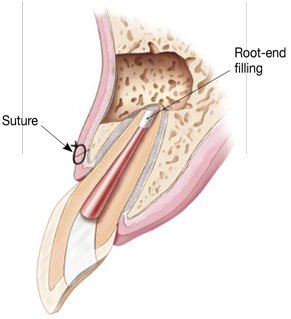Here’s what we do!
-
Endodontic treatment is the technical name for the dental procedure commonly referred to as "Root Canal Treatment". The word Endodontics originates from the Greek words "endo" meaning inside and "odont" meaning tooth. Thus Endodontic treatment refers to treatment of the inside of the tooth.
Root canal treatment is performed when the tooth's pulp (sometimes referred to as the nerve) has become diseased or infected. Root canal treatment involves cleaning, shaping and filling the inside of the tooth to make it disease free and functional again.
Our treatment processs begins with a consultation. The Endodontist will conduct an examination, perform some clinical tests and obtain some Xray pictures of the tooth and supporting tissues. The Endodontist will also discuss the costs for treatment, the prognosis and alternatives to endodontic treatment.
Before root canal treatment is commenced, the Endodontist will administer Local Anaesthetic and place a barrier around the tooth, called a Rubber Dam, to keep it isolated from the rest of the mouth and to keep it clean and free of saliva during the procedure. At the commencement of treatment the Endodontist will make a small access into the tooth. The space inside the tooth is cleaned and shaped using small files, disinfecting solutions and medicaments.
Once the space has been sufficiently cleaned, the Endodontist will seal the space with a rubber filling material called "Gutta Percha" and a resin cement. In some cases this can be done at the same time as the cleaning appointment and in other cases it will be done at a separate appointment. During the procedure a number of x-ray pictures will need to be taken to ensure that the tooth is being treated to the correct length and depth. Endodontic treatment can be completed in a single visit in many cases, however, some cases will require additional visits. Each situation is different and individualised.
At the completion of Endodontic treatment a strong temporary restoration will be placed into the access cavity at the opening of the tooth. A final x-ray picture is taken at the completion of treatment. Once the root canal treatment is completed by the Endodontist, it is important to return to your referring dentist for the final permanent restoration of the tooth. The final restoration is designed to protect and restore the tooth back to normal function. In many cases, the final restoration may be a cap or crown over the tooth.
-
Endodontic microsurgery is a procedure that is carried out if there is persistent inflammation or infection of the bony tissue around the end of a tooth. Surgical endodontic treatment is generally performed after Root Canal Treatment or Non-surgical Endodontic Re-Treatment. In some cases, Endodontic microsurgery will be performed as an alternative to non-surgical re-treatment if the canal space is inaccessible because of blockages or extensive restorations. The Endodontist will remove the infected tissue and in some cases will remove some of the very end of the root tip and palce a small filling at the end of the tooth to seal the root canal. Like other endodontic procedures performed at Geelong Endodontic Specialists, microsurgery is performed with modern, high tech equipment under high magnification with the aid of the operating microscope to ensure the best possible outcome.
-
Endodontists are specifically trained to manage trauma to the dental tissues and supporting structures. This include displacement, avulsion and fracture of teeth, and injuries to the tissues that support the tooth.
Dental injuries are considered emergencies and usually require immediate management. If you suffer an injury to the dental tissues, it is important to contact your dentist or Endodontist as soon as possible.
-
Toothache can be particularly debilitating. Whilst the cause of toothache or orofacial pain may be obvious in many cases, it can be difficult to localise or diagnose in others. Endodontist are specifically trained to diagnose painful conditions effecting the teeth and orofacial structures. We are also called upon to manage difficult pain conditions that have not responded to previous attempts to treat.
Our advanced technologies
-
Dental operating microscope
What should we know about the services you provide? Better descriptions result in more sales.

-
Digital radiography and cone beam CT
What should we know about the services you provide? Better descriptions result in more sales.
-
Laser assisted irrigation with Fotona SWEEPS
What should we know about the services you provide? Better descriptions result in more sales.




